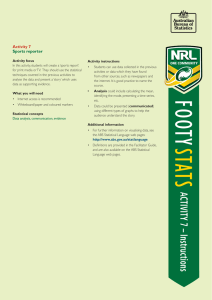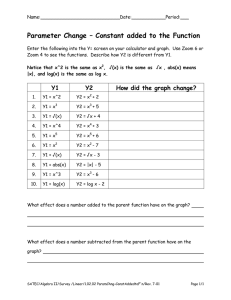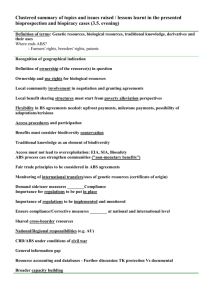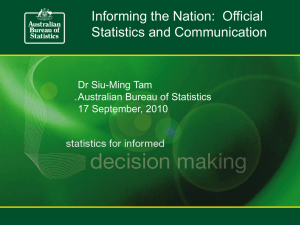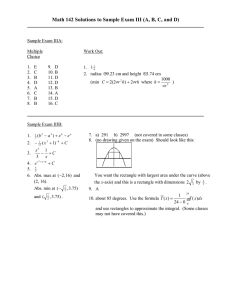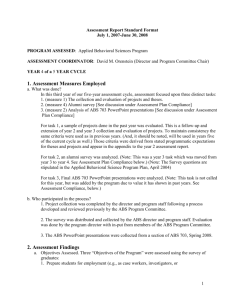Applied Behavioral Science (M.A.)
advertisement
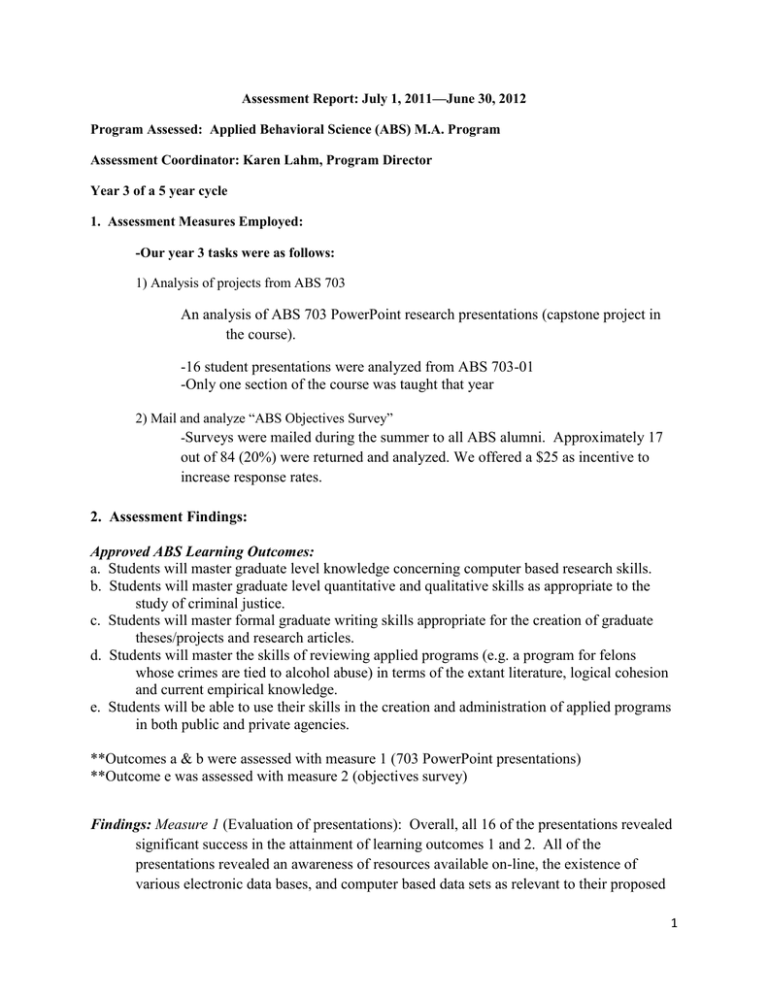
Assessment Report: July 1, 2011—June 30, 2012 Program Assessed: Applied Behavioral Science (ABS) M.A. Program Assessment Coordinator: Karen Lahm, Program Director Year 3 of a 5 year cycle 1. Assessment Measures Employed: -Our year 3 tasks were as follows: 1) Analysis of projects from ABS 703 An analysis of ABS 703 PowerPoint research presentations (capstone project in the course). -16 student presentations were analyzed from ABS 703-01 -Only one section of the course was taught that year 2) Mail and analyze “ABS Objectives Survey” -Surveys were mailed during the summer to all ABS alumni. Approximately 17 out of 84 (20%) were returned and analyzed. We offered a $25 as incentive to increase response rates. 2. Assessment Findings: Approved ABS Learning Outcomes: a. Students will master graduate level knowledge concerning computer based research skills. b. Students will master graduate level quantitative and qualitative skills as appropriate to the study of criminal justice. c. Students will master formal graduate writing skills appropriate for the creation of graduate theses/projects and research articles. d. Students will master the skills of reviewing applied programs (e.g. a program for felons whose crimes are tied to alcohol abuse) in terms of the extant literature, logical cohesion and current empirical knowledge. e. Students will be able to use their skills in the creation and administration of applied programs in both public and private agencies. **Outcomes a & b were assessed with measure 1 (703 PowerPoint presentations) **Outcome e was assessed with measure 2 (objectives survey) Findings: Measure 1 (Evaluation of presentations): Overall, all 16 of the presentations revealed significant success in the attainment of learning outcomes 1 and 2. All of the presentations revealed an awareness of resources available on-line, the existence of various electronic data bases, and computer based data sets as relevant to their proposed 1 projects. Also, all of the students showed an awareness of a variety of qualitative and quantitative approaches to collecting data. All of the proposed methodological techniques were suited and useful to the topics at hand. Overall, the data indicate an extremely high rate of success in attainment of the targeted learning objectives. Measure 2 (Objectives Survey): Of the 17 surveys that were returned: 100% of the former students were currently employed. The majority were working in jobs related to the ABS/CRJ field, such as juvenile court worker, case worker, corrections officer, chief psychologist, investigator, probation officer, social services worker, etc. Some 54% were satisfied with the skill preparation provided by the ABS program for their current job. Forty one percent were seeking or had sought further education. Five of these were advanced degrees (other Master’s and advanced degrees). All but two of those seeking more education were satisfied with the preparation the ABS program gave them for future education. Some suggestions for improvement were as follows: need more internships, need more specific CRJ courses, courses need to be more rigorous, and the program needs to help with job placement. Overall, it appears that the data indicate that Outcome 5 is being attained by our graduates. 3. Response to Assessment Findings: Completed all semester conversion materials, web site, etc. We offered two new (7600) seminars (Family Law and Sex Offenders) to be offered the following year. We have several more students (10) involved in internships over the past two years than in several years prior—this will help with job placement . We are also actively monitoring internships, which we have not done in the past. We also have more of our students involved with career services than ever before (they now present at our orientation every year). We are trying to address the student’s need for help with job placement. 4. Assessment Activities for Coming Year: We will be collecting projects and theses to assess learning outcome c (see above) and holding a focus group (spring) to assess learning outcome a (see above). We will try to email surveys rather than send paper versions to hopefully improve response rates. We will also be working on a rubric for assessing ABS 7120 projects (similar to the check sheet for projects and theses). 5. University Learning Outcome Assessment: We will assess University Learning Outcome #1 and #2. Both outcomes will be assessed by examining a sample of projects and theses for a given time frame (ABS 7800 and 7910, respectively). 2 Appendix A: Evaluation of Thesis and Projects for ABS Program 1. Research involves analysis of quantitative or qualitative data No ____ Yes ____ generally acceptable in the social sciences 2. Research involves a clear and explicit research question or No ____ Yes ____ hypothesis related to the fields of criminal justice or social problems. 3. Contains (when appropriate) a title, abstract, literature review No ____ Yes ____ statement of methodology, description of data and findings, analysis and conclusions drawn from the data, and applied implications of the research. (Circle any missing or inadequate) 4. Citations, notes, and references presented in style generally No ____ Yes ____ 6. Relatively error free in terms of grammar and punctuation. No ____ Yes ____ 7. Graphs, charts, tables are in APA or other approved style No ____ Yes ____ acceptable in the social sciences. Score (1 point for each yes response) ______________ 3
